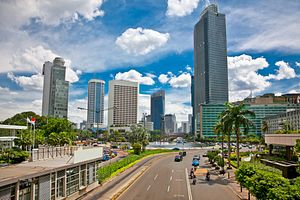Do a bit of research on investment in Indonesia, and very quickly you’ll come across two words: “inefficiency” and “corruption.” Labeled “A New Hope” by Time Magazine, the newly elected president of Indonesia, Joko Widodo is looking to reform Indonesia’s bureaucratic system.
In the spotlight at the recent APEC Summit, Joko shone, speaking with Javanese-tinged English, conveying his vision for Indonesia to the people of his country. He is known as being capable of introducing efficient, effective systems, most recently in his post as governor of Jakarta. But he’ll have an uphill battle making Indonesia more attractive to foreign investors, beginning with the country’s sluggish business registration system.
Being a member of the G20 does not necessarily mean an economy is robust or that a country’s bureaucracy is functioning effectively. The latest “Ease of Doing Business” report released by the World Bank clearly reflects the state of Indonesia’s bureaucracy. Ranked 114th out of 198 economies, Indonesia is ahead of only India, Brazil and Argentina among the G20 countries. In Southeast Asia , Indonesia is outdone by neighbors Malaysia and Brunei Darussalam, both ranked 18th and 101th, respectively, in terms of ease of doing business.
One of the main reasons for Indonesia’s low-ranking is the difficult entrepreneurs have starting a business. For instance, investors thinking about setting up operations in Indonesia have to go through an average of 10 processes – taking about 52.5 days. Compare that to Malaysia’s three-process system, which takes, on average, only 5.5 days to complete. Other Southeast Asian countries, such as Vietnam and the Philippines, also do better than Indonesia on this score. Investors starting a business in Vietnam still have to go through 10 processes – but they’ll be done in 34 days. And in the Philippines, entrepreneurs have a whopping 16-step system to endure, but it still only takes 34 days to complete everything. Both nations outperform the East Asia & Pacific average of 34.4 days.
Looking more broadly, in terms of starting a business, Indonesia ranks 155th out of 189 economies, outperformed by the likes of Burkina Faso, St. Kitts and Nevis, and Papua New Guinea, none of which are anywhere near Indonesia’s status as the world’s 9th largest economy on a purchasing power parity basis. A combination of inefficiency and corruption is what makes Indonesia’s bureaucracy so complicated and frustrating.
According to the World Bank’s “Doing Business” report, starting a business in Indonesia means dealing with legal services at four different ministries and getting legal certificates for establishment, insurance, and other needs. The ministries involved are the Ministry of Law and Human Rights, the State Treasury, the Ministry of Industry and Trade, and the Ministry of Manpower. Given rampant inefficiencies inside the ministries themselves, applying for a certificate means having to go through multiple bureaucrats in different positions. The method is outdated and very inefficient, especially for a country with Indonesia’s ambitions. Sooner or later, a new and more efficient system will be needed.
Other emerging economies have the same idea . The Indian government has proposed a series of steps to improve the nation’s ease of doing business, including a radical initiative that would reduce the time needed to register a business to a single day, with a single registration code for all labor laws, and reduced taxes. According to the Jakarta Post, India is targeting a major improvement, from its current rank of 142nd in terms of ease of doing business, to a spot in the top 50 in the next few years.
Indonesia should do the same. Reducing taxes and certificates and cutting the time needed to register a business, as well as installing an online database – all of these would be in step with Joko’s notion of computerization.
Joko has yet to implement a new system, but ever since he declared himself a presidential candidate, investors have been expecting big things from him. Removing the bottleneck in Indonesia’s business bureaucracy will be a major catalyst for economic growth. Small and medium enterprises could flourish and foreign investors may well coming rushing in, making 5.8 percent growth seem modest.
Although it’s obviously easier said than done, the Indonesian government needs to get serious about dealing with this – and fast. Until a new system is introduced, potential investors can only keep their eyes on Joko and his team, and there’s no telling how long they’ll wait for good news.

































